Dementia Diaries provide a window into the lives of people living with dementia
The number of people living with dementia in the UK alone is expected to reach one million by 2025, and the Government, healthcare professionals, charities and community organisations are striving to educate people about what dementia is, what causes it and how to support those living with it.
Dementia Diaries is part of the Dementia Engagement and Empowerment Project (DEEP) and works in partnership with Innovations in Dementia. The project has been designed to help challenge and change perceptions about what life is like living with dementia by publishing an archive of audio-diaries from people living with dementia.
’Dementia is everyone’s business’
The Comic Relief funded project is co-ordinated by On Our Radar, a small non-profit communications agency who work with marginalised groups to voice their opinions and to spark a change in attitudes towards dementia.
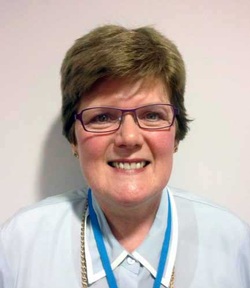
Editorial and engagement manager at On Our Radar, Paul Myles explained: “Dementia Diaries uses basic mobile phone technology and provides people living with dementia with the opportunity to tell their own story and shape their own narrative, reporting on their community as they see it.”
Anne Macdonald is a diarist from Glasgow, she commented: “Nothing prepares you, aged 55 years, to be given a diagnosis of Alzheimer’s. Devastated, I went through a grieving process, then realised I was still me, and accepted it.
“To get through this you need to take charge of your life again. Build up your confidence, take up all the things you did before. Don’t allow yourself to be consumed by dementia. I can still do many things I did before. Some I need a little help with, and if so, I will ask. Be as independent as you can. Don’t let people undermine you, to fit someone’s tick box.”
Below, project participant Paul Hitchmough talks about why it is important that people living with dementia can have their say.
Diarists are a range of ages, all living with a different stage of dementia, some have young onset dementia, being forced to leave work early in their forties while other participants are much older.
A true picture of how people are living with dementia
Dementia Diaries participant, Chris Norris is living with young onset dementia. He said: “People look at you almost with disbelief, as if to say ‘Well you can’t possibly have dementia, you’re not old’. And that’s unfortunately the perception in society, which is getting better but people still perceive it to be an old person’s disease.
“They just picture their grandparents or whatever or they picture somebody, maybe, away, not a lot away but out of society, sitting in the corner with nothing to say which certainly isn’t the case if you have young onset dementia. You still have a voice and you’re still very active in your community to put that voice out there. But people just don’t believe that it’s possible for you to have dementia when you’re young.”
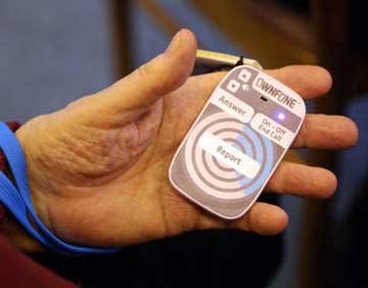
On Our Radar holds training sessions for local dementia support groups where participants are informed how the project works and shown how to use the 3D printed Own Fone handsets to record their diary entries. Entries are recorded by an automatic mailbox, making it ideal for older users who are more familiar with leaving a message rather than attaching files and sending an email. Then they are transcribed and published on the Dementia Diaries website.
Paul said: “Due to difficulties some of them may have with technology, they are less represented as a group in digital media and less likely to have an opportunity to be heard. We were tasked with trying to capture these discussions and make them heard across the country to improve public perceptions and understanding of dementia."
Promoting the potential to 'live-well' with dementia
Diarist Alice Sands regularly records her experience of living with dementia. She commented: “Main thing is to approach a person with dementia by mentioning their name. If you say their name it reduces a lot of the tension. Even if they only say something simple like: ‘I believe you’re Mrs Sands, how would you like me to address you? Do you want to be called Alice or Mrs Sands?’ – that immediately takes away any animosity I might have towards that person.”
Dementia Diaries began in January 2015, in a pilot that has since been extended until September 2016, and now it is part of an independent research evaluation by Leeds Beckett University. The evaluation was commissioned by On Our Radar and is part of an extended plan by Comic Relief to see how successful the project has been, and whether it could be applied to other minorities and those with other health conditions.
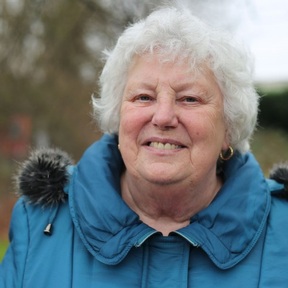
Reader in health promotion and co-director of the Centre for Health Promotion Research at Leeds Beckett, Dr James Woodall, said: “The aim of the Dementia Diaries is to both promote the potential to ‘live well’ with dementia and to challenge stigmatising media coverage of the condition are so important in fostering a dementia friendly society.”
Speaking about the impact the diaries are having Paul said: “The insight you get from a media story-telling perspective is very raw, which is very different from what you get when there is a film crew and cameras in someone’s home and the ‘in the moment’ feel really comes across. There are over 100 forms of dementia and different people are affected in different ways and it is a very individual thing.
“The project works by giving people in the DEEP network a voice and a platform to get their feelings and opinions out there, rather than putting pressure on strangers to have to report on their experiences, participants are already talking about their experiences in a group setting because they want to communicate their feelings and be involved with others.”
Improving services and changing policies
On Our Radar is encouraging people and organisations to use the diaries to help improve services and polices, including businesses who can use the diary entries to help improve their services to people with dementia.
Paul said: “Something we’re really keen to stress is that we’re really interested to hear from people who want to use the equipment for educational or informative purposes as we have over 1,500 insights from around the UK from people living with dementia.
“People have taken to the project really well and the project is already funded so we’d love to work with other organisations to make sure that content is used, especially those who work with people with dementia.”
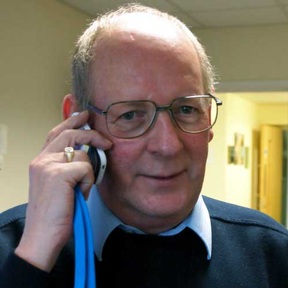
He continued: “A lot of the Dementia Diaries participants thought 'oh well, I've been written off'; they didn’t believe that they would have the opportunity to be a new technology user and to be developing their storytelling skills and to be featured in national media and other places.
"There's a pride in picking up these new skills, adapting to new technologies and actually achieving something new in their lives when often people get diagnosed with dementia and people consciously or subconsciously write them off a bit and be like 'it's downhill from there'. There's a lot about what they can't do anymore, and they're not denying that, but a lot of their faculties are still there, a lot of their personality traits are still there. The collective experience of having a group to belong to which they are campaigning with and lobbying on issues with a sense of purpose has been very positive."
Chris added: “Every weekend we mention the Dementia Diaries, just sort of keep it bubbling away there, because it is such a perfect resource to get the true picture of how people are living with dementia. What the Dementia Diaries does is it just, you know, you can go in and you listen, and you go, it’s just so real, that’s why, it’s real, rather than it’s just somebody written something down. It’s so real and that’s why we keep raising it everywhere, to raise the profile of how good it is, really. ‘Cause it is.”
For more information on Dementia Diaries, visit: http://dementiadiaries.org/
Latest Innovative Care News
 13-May-19
'Pink drink' brain cancer treatment rolled out across NHS in memory of Baroness Jowell
13-May-19
'Pink drink' brain cancer treatment rolled out across NHS in memory of Baroness Jowell
 25-Apr-19
Louis Tomlinson helps 83-year-old who lost wife to dementia complete bucket list
25-Apr-19
Louis Tomlinson helps 83-year-old who lost wife to dementia complete bucket list
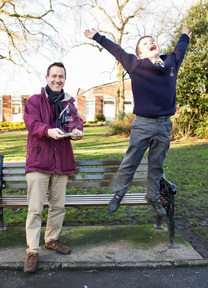 05-Mar-19
Care worker of the year inspires nine-year-old son to work in care
05-Mar-19
Care worker of the year inspires nine-year-old son to work in care
 12-Feb-19
Michael McIntyre's jokes tested to see if they stop elderly catching flu
12-Feb-19
Michael McIntyre's jokes tested to see if they stop elderly catching flu
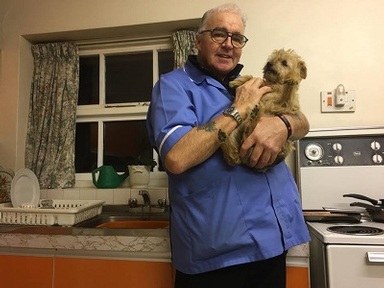 25-Jan-19
Ninety-year-old and his dog can stay together, thanks to care worker
25-Jan-19
Ninety-year-old and his dog can stay together, thanks to care worker